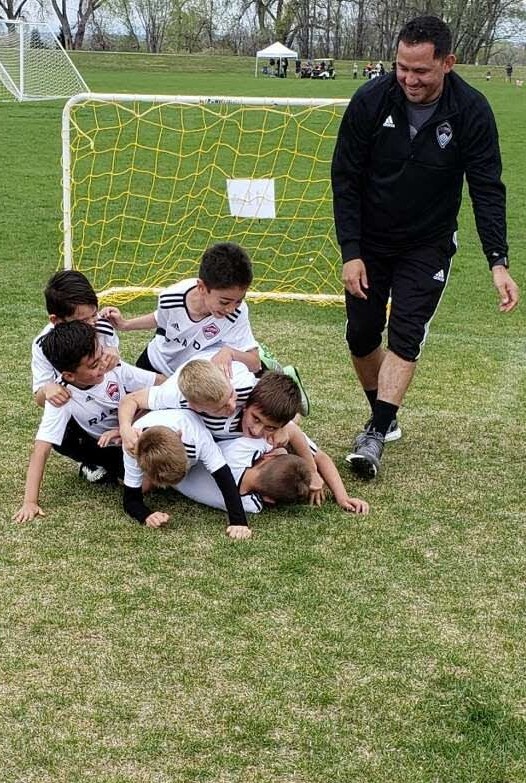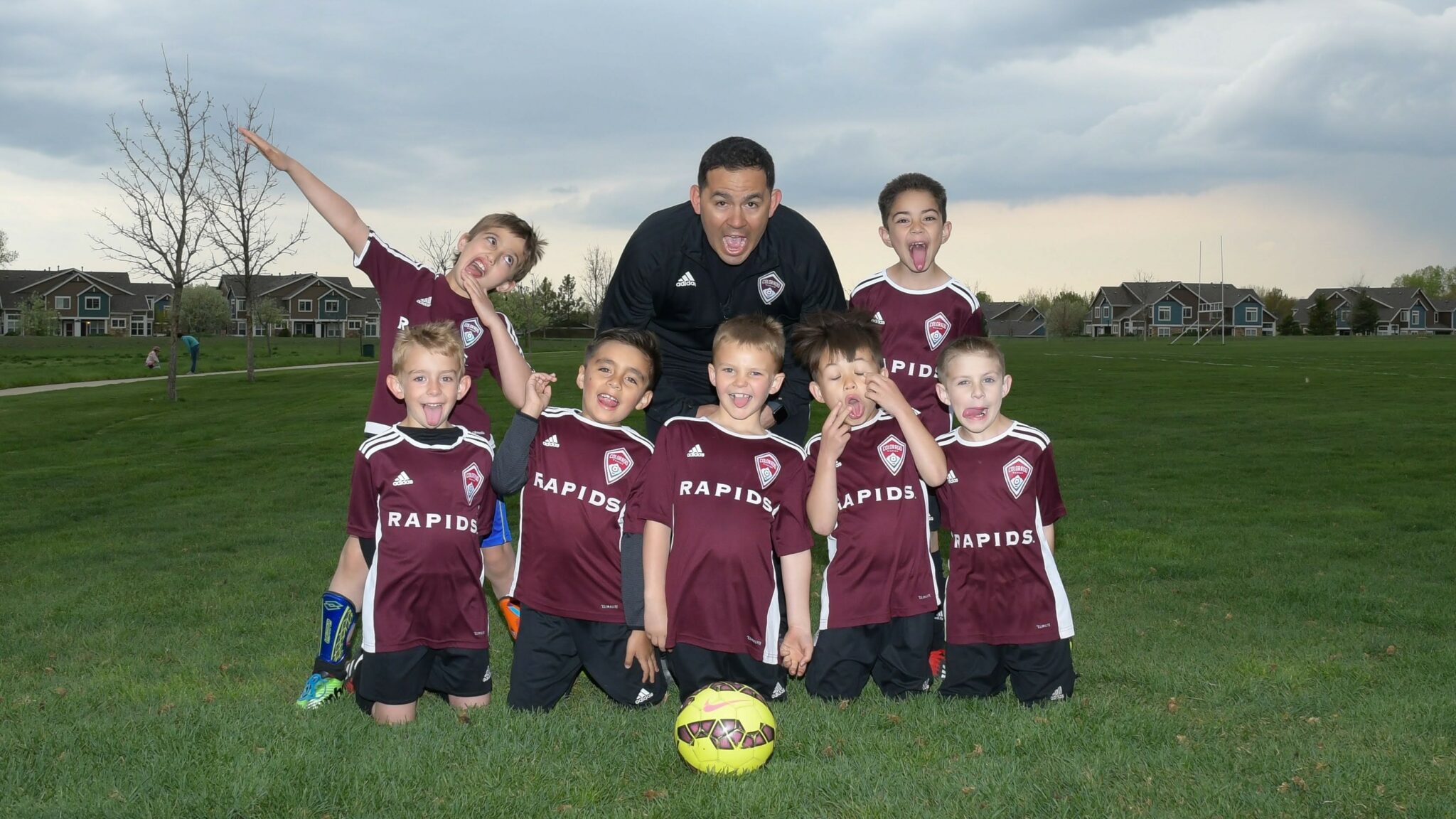
Each season, we ask CRYSC members to provide us with their thoughts and opinions on their Rapids Youth Soccer experience in our Membership Satisfaction Survey. One of the things we look for are ways to better understand the dynamics within the greater soccer community and what we offer at Rapids. Through these surveys we have been able to identify outstanding coaches that are making an impact beyond their role and finding success that extends beyond the field.
One of these coaches is Lance Griego, who manages the Rapids 12B North Raptors team and his son’s Soccer Start team. Below you will find and interview with Lance where he gives us his thoughts on coaching at Rapids Youth Soccer and his experience helping players grow both on and off the field!

Lance, what is the first thing that comes to mind when you think about what may be enabling your coach scores?
Fortunately, I’ve had the chance to coach some of these boys for a few seasons now. I started coaching them when my son was five. At that age I just said to myself, “They’re five. They’re not learning all the tricks, just let them have fun. Get them excited.” You know how five years olds are—I just try to go out there and get goofy with them, have fun, and help them get interested in the game.
Can you provide an example of something you do to make it fun?
One thing I’ve really tried to get them to do is get excited and celebrate together as a team when they score a goal; Really make sure they know it’s okay to get a little goofy and have fun. And if they sometimes get distracted chasing butterflies, that’s fine too. For me, the most important thing is trying to get them excited about being there and wanting to come back.
To give a specific example of helping kids enjoy the game, we just had a kid start in our 2012 team in the Fall. He’s on the younger end of the team and you can tell he’s still trying to figure out how he feels about soccer. Maybe because he’s younger, it can sometimes be difficult during games to get him motivated. However, I’ve found there’s usually a way to connect with kids. For example, he was wearing a Spider-man hoodie under his jersey. So I asked, “What would Spider-man do in this game? I bet he’d go out there and get that ball!”. I enjoy getting creative to find motivations for each player.
What are some actions you’ve found get them excited and wanting to come back?
To me, it all comes back to the fun. Since I’ve coached under Clint Shade, the Rec Director in the North region, I’ve learned from him a lot. I see how he is with the kids—he’s goofy and the kids love it. They play a game where they chase him around, kick him with the ball—they love it. So it’s been easy for me to carry on with that especially when he is out there giving such a great example on how to engage the kiddos.
Sometimes I wonder, ‘If I was a kid, what type of team would I want to play on?’ I’d want to be on a team that has fun. We don’t care about the score too much at this age, we just go out there and enjoy playing.
When you stay with a team for a couple years, how do things change over time?
As the players get older, I feel like there is a change. I don’t know if I’d say there’s a shift in not being as goofy, but I have added more technical focus into training. You can see the players expectations grow in what they want to do—they want to improve. So as a coach, I still focus on fun but I also start holding them to higher standards in how they play the game.
As a parent-volunteer coach, how do you interact with your son compared to the other kids?
I remember one bad experience growing up where the coach of one of my teams had a son on the team. It was frustrating. That coach clearly gave more attention and opportunities to his son than the rest of us. I think that experience has made me hyper aware to not be like that. During games, I depend on my wife to be the enthusiastic parent cheering on our son and I try to be the coach and treat every player as equals. I’m sure I’m not perfect at staying unbiased, but I try.
I try to separate soccer coaching time from parent time. On the car ride home, for example, I don’t say “man, you didn’t work hard today” or things like that. When we’re walking off the field, I might ask, “How’d you feel today? How do you think you did?”. Then based on his response, I’ll also share my thoughts on what he did well and what can be improved. But once we get in the car, it’s “all right man, what are we eating for dinner?!” or “what else do we want to do today?!”. I want him to know that he’s not constantly under coach dad’s scrutiny and soccer is just one part of our family.
Another thing I do is I often ask kids before training how school was or small talk with them about the other things that may be going on in their life. I feel like if I can show that I care about them just as much as my kid and as more than a soccer player, they’ll feel like they belong.
How would you describe your relationship with the other parents on the team?
I don’t know if there’s anything special or intentional I do beyond trying to be helpful and communicate well. As a parent, I know how busy things get with school and my own work so soccer specifics like practices and games aren’t always top of mind for parents. Given that, I try to over-communicate to make things easy and help with a lot of the thinking or remembering that goes with being a soccer parent. For example, I send a reminder before each game with the time, location, jersey color, and who’s bringing snacks. I’ll keep my eye on the weather and keep them updated as needed. And I think parents feel comfortable texting or calling me if they can’t make it, have a question, or need anything. Having good communication both ways seems to be helpful.
Is there anything special you do in training, regarding your activities or technical advice?
I don’t know if there’s anything out of the ordinary about my trainings. Everything is pretty similarly structured across our rec teams in the North. For example, we have the same 15 minute warmup. Then we have 30 minutes to work on team stuff with the final 15 minutes reserved for scrimmaging.
During that 30 minute time and at their age, I would say our big focus is mostly on dribbling and technical skills—trying to make them better players. I tell the boys, “In this time period, we’re working on you.” We’ll work on their moves, passing technique, and shooting. And again, Clint has the trainings for that day planned so I just try to give them the best tips I can to develop those skills.
We work on passing as well, but often it’s more about reminding them to spread out and look up. Sometimes I find it helpful to tell them “spread out and score a goal” and then let them try. Over time, they’ve started putting more of the pieces together and passing more and improving their overall game.
Do you ever have behavior issues? If so, how do you respond?
First, I try to understand and adapt to each kid to lessen the chance of that happening. But it’s true, one of the hardest parts of coaching is that it is like herding cats. While some players seem to naturally be more focused, others find it harder to focus and that’s ok. Sometimes I think it’s helpful to be stern with them—maybe making them sit for a few minutes or threatening to do so—to help them understand what is expected. Soccer is supposed to be fun, but we also need to make sure we’re working and not getting in the way of other kids working. I’ve only had to sit a kid once, but I think it helped show I was serious. It’s very tough on kids at that age to have to sit while the other kids are playing, but it’s only for a couple minutes and I think it helps them refocus.
Another thing I tried that worked was talking with players before training about “Can you give me one good hour? An hour of focus and then you can be goofy and do whatever you want”. Then when they agreed and gave me a fist bump, it was like we had a pact. Then if he started to mess around during training, I’d say, “Hey, you promised man!” And he’d be “oh, oh yeah” and then refocus.
Lance, this all sounds so simple. Prioritize the fun, communicate with parents, and things will go well.
I don’t know, I just try to keep it simple. But it doesn’t happen automatically. For me, I have to switch my work schedule around to be there, and sometimes it can be difficult to do so. I figure if I’m doing all that work to be there, I’m going to make it worth it. I want to try my best when I’m out there.
Lance, thank you for your time and willingness to share. Your love of the game and joy for each player is obvious and inspiring. Any final thoughts or advice to others before we wrap up?
My main advice is to have fun. In my opinion, the number one priority is to have fun. It’s not to be the best or to score the most goals. Yeah, the kids do have fun when doing those things, but prioritize having fun in general. With that perspective, the kids can enjoy the game when they’re winning 10-0, losing 0-10, and everything in between. Don’t be afraid to get a little goofy and try to imagine what would be fun for kids that age.
In the end, when I think about my team, I just want to see them having fun and growing into soccer players with a deep love of the sport like I have. That’s my favorite part.
We hope you enjoyed reading about Lance’s soccer journey and his thoughts on coaching! Watch this space, each month, for more articles highlighting the incredible coaches working at Colorado Rapids Youth Soccer Club. Thanks for reading!









